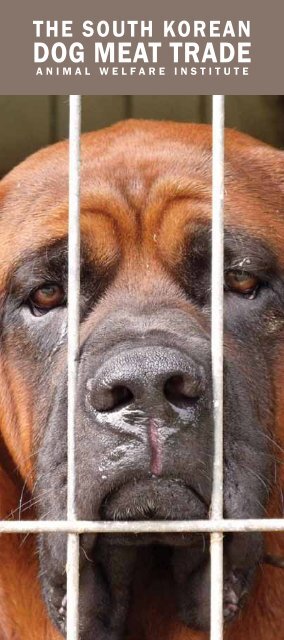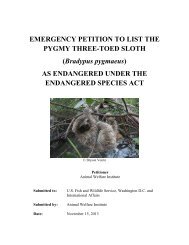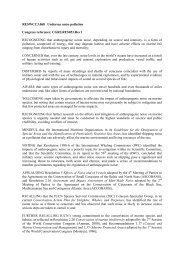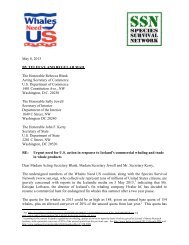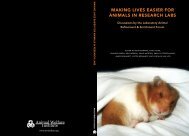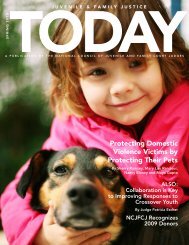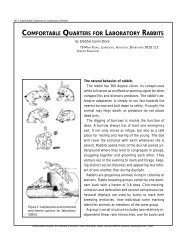THE SouTH KoREAn DoG mEAT TRADE - Animal Welfare Institute
THE SouTH KoREAn DoG mEAT TRADE - Animal Welfare Institute
THE SouTH KoREAn DoG mEAT TRADE - Animal Welfare Institute
You also want an ePaper? Increase the reach of your titles
YUMPU automatically turns print PDFs into web optimized ePapers that Google loves.
Dog meat farms are scattered throughout the countryside,and the industry is estimated to be worth US$2 billion.The farms primarily raise a type of large, yellow, mixedbreeddog common in the region. The “farmed” yellowmixed-breed dogs are not the only dogs eaten, however—despite claims by some supporters of the industry.Abandoned pets are a common phenomenon in SouthKorea, and small, purebred dogs fall victim to the dogmeat trade, as well, after they are unceremoniouslydumped into the streets by owners who have growntired of them. Such abandoned dogs are picked up by acollector, stuffed into tiny wire cages filled to capacity withother such dogs, and taken to Moran market—the largestdog meat market in the nation—and other smaller marketsaround the country to be slaughtered.Legal StatusSouth Korean law is ambiguous on the legality of the dogmeat trade and official efforts to reign in the trade havebeen half-hearted at best. One legal analyst concludedthat “Despite the significance of the industry, there isno clear law governing the trade of dog meat. There isneither explicit recognition of dog meat as legitimatefood, nor a clear ban on the sale or slaughter of dogs forfood.” According to the South Korean non-profit, Korea<strong>Animal</strong> Rights Advocates (KARA), “It is technically illegal toprocess dogs like livestock and use dog meat as any kindof food product. However, it is not illegal to breed, or raise,or slaughter dogs for dog meat.”South Korea’s <strong>Animal</strong> Protection Act of 2007 expresslyprohibits some of the cruel methods used by people inthe dog meat trade to handle and slaughter dogs. Thelaw, however, is widely ignored, despite being revisedwith stronger penalties. With no substantive enforcementaction to curb the sale of dog meat, it is available inrestaurants throughout the country. In the late 1990s,a government survey estimated that well over 20,000restaurants—counting those that were unregistered—offered dog meat. A similar number of such restaurantsare believed to be in operation today.
Premeditated TortureAkin to the abysmal manner in which pigs and chickens areraised for meat in factory farms, dogs raised for meat inSouth Korea endure miserable living conditions. From birthto slaughter, these dogs are kept in cramped, rusty cagesstacked on top of each other. The method of slaughter isoften extremely—and intentionally—brutal, and the dogs arecommonly butchered in full view of the others.Most horrifically—due to a widely held belief that highadrenaline levels will produce tender meat and increasethe supposed health benefits—many dogs who are killedare sadistically made to experience extreme fear andsuffering prior to death. Dogs are typically killed viabludgeoning, hanging, or electrocution. Many dogs arehung and then beaten to increase their fear and panic.Some even have a blow torch used on them while theyare still alive to remove their hair. At the open-air markets,dogs are electrocuted and their necks are broken—all inplain sight to passers-by.KARAIn this picture, two men hoist a dog up to hang by the neck—a common practice. Often, while hanging, such dogs are beatenwith sticks.
You Can Make a Difference forKorean DogsMany South Korean animal advocates see their nation’shosting of the 2018 Winter Olympics as an opportunity tofocus international light on the practice, and in so doingfinally bring an end to the deplorable dog meat trade.Please send letters to the South Korean Ambassador, thePresident of South Korea, and the Secretary General ofthe United Nations urging South Korea to stop the killingof dogs for human consumption.Honorable Ambassador Choi Young-jinEmbassy of the Republic of Korea2450 Massachusetts Avenue, NWWashington, DC 20008Her Excellency President Park Geun-Hye1 Cheongwadae-ro, Jongno-guSeoul 110-820Republic of KoreaThe Honorable Ban Ki-moonSecretary General760 United Nations PlazaUnited NationsNew York, NY 10017Maggie McElhennyLucy Lu, rescued from a shelter inSouth Korea, was named “AmbassadorDog of Korea” in 2011 by the Korean<strong>Animal</strong> Protection and EducationSociety. Now living in Washington,DC, she continues her ambassadorialduties through outreach on Capitol Hill.
Maggie McElhennyAWI’s Rosalyn Morrison (far right) spent two years in South Korea,where she advocated for ending the production and sale of dogmeat. Here, young South Koreans stop to admire “Ambassador Dog”Lucy Lu in Myeongdong, a central shopping area in Seoul.For more information about the dog meat trade and whatindividuals can do to fight this cruel industry, please visitAWI’s website:http://awionline.org/dogmeatA number of organizations are working within South Koreaand beyond to build awareness of the issue and shutdown the dog meat trade. Learn about their efforts byvisiting the following websites:International Aid for Korean <strong>Animal</strong>shttp://koreananimals.orgKorea <strong>Animal</strong> Rights Advocateshttp://animalrightskorea.orgKorean <strong>Animal</strong> Protection and Education Societyhttp://www.kapes.or.kr (in Korean)


